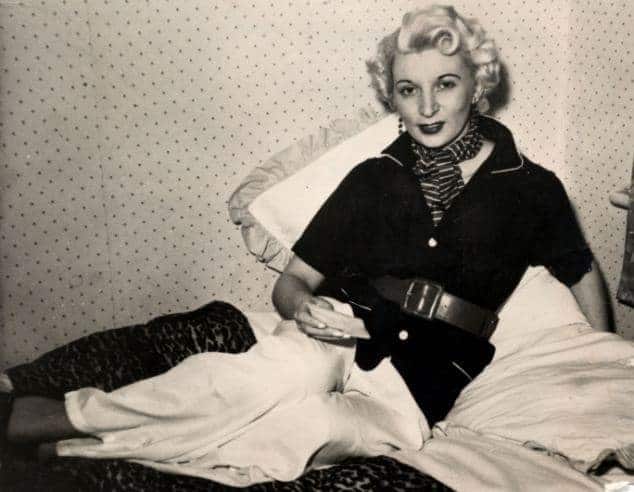On July 13, 1955, famed British hangman Albert Pierrepoint slipped the noose around the neck of Ruth Ellis. The execution took just 12 seconds, but her body hung for an hour. Ellis’ execution marked the last time a woman was executed for murder in Britain. Her trial and execution gained national attention, not just because of her gender, but due to her unusual behavior throughout the ordeal. To observers, it seemed as if Ellis had a death wish, and she made no attempt to defend the slaying of David Blakely.
Early Life
Ellis was born Ruth Nielsen in Rhyl, Wales on October 9, 1926, and reportedly suffered abuse and attempted rape at the hands of her father. She left school at 14 and worked as a waitress before her family moved to London in 1941. Three years later, Ruth became pregnant with the child of a Canadian soldier who abandoned her soon afterward.
By 1950, she worked as a hostess in nightclubs and took up prostitution. Ellis became pregnant with the child of a customer and had an abortion (illegal at the time) before going back to work as soon as possible. In November 1950, she married George Ellis; he was a violent and jealous alcoholic who beat Ruth often. She had a child by George in 1951, but he too abandoned her and the baby.
In 1953, Ellis became manager of the Little Club and fell for the man that would define her life, David Blakely. He was from a wealthy family, and he moved in with her even though he was engaged to another woman. It became an open relationship, and a violent one too. Blakely beat Ellis often, and in early 1955, he punched her in the stomach and caused a miscarriage.

Cold-Blooded Murder
Blakely was good friends with the Findlater family; they despised Ellis because they thought she was ‘common.’ Over Easter Weekend 1955, Blakely was building a race car with Art Findlater, and he refused to see Ellis as he was fed up with her constant desperate phone calls. She wrongly believed he was having an affair, although he had seen other women during their relationship. Ellis was not blameless either; she had an affair with Desmond Cullen, and on the evening of April 10, 1955, she persuaded him to drive her to Hampstead where she waited for her other lover.
Blakely emerged at 9:30 pm with his friend Clive Gunnell and ignored Ellis as she called out to him. She pulled out a Smith & Wesson and shot him before following him to his car and shooting him a second time. Blakely collapsed on the ground and Ellis emptied the remaining four bullets into him. One of the bullets was fired so close to the victim’s back that it left powder burns on his skin.
Various people emerged from the pubs in the surrounding area, and an off-duty policeman arrested Ellis. She made no attempt to escape and appeared calm and relaxed when detained in Hampstead police station. Immediately after the shooting, she apparently asked Gunnell to call the police.

